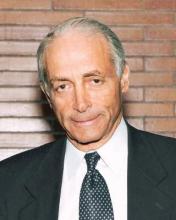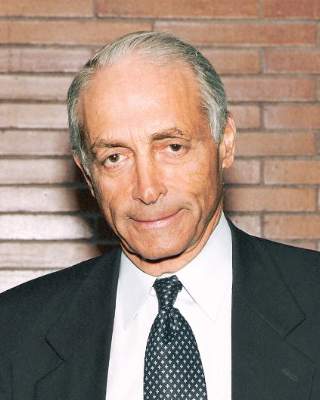User login
Vascular surgery has a rich, varied and enormously interesting history, filled with innovators and creators whose inventions changed the course of patient care. This history has been well-documented innumerable times.
Dr. Frank J. Veith is a part of that storied history. However, during the John Homans Distinguished Lecture Thursday morning, he will look ahead, and not back.
During “A Look at the Future of Vascular Surgery,” he plans to discuss the implications of future changes in the field, not to mention the world of medical care, and “what vascular surgery has to do to survive,” he said.
In mid-April he was working on the VEITHsymposium he created more than 40 years ago and so had not yet finalized his thoughts on his lecture.
But at that time he believed he would revisit his long-ago Presidential Address, “Charles Darwin and Vascular Surgery,” delivered in June 1996 and which also discussed the future of vascular surgery.
He noted then that it was a “time of enormous upheaval in American medicine, and holding this office has also forced me to focus on the future of Vascular Surgery and how well it will survive these turbulent times.” As Darwin studied extinct and contemporary species, his thoughts on survival could be correlated to that of the subspecialty itself, Dr. Veith said.
The endovascular revolution had begun and he was convinced – and stated – that vascular surgeons would need to learn endovascular skills. “People thought I was crazy when I said that endovascular was going to replace most of what we did,” he said. “I turned out to be very right.”
Some of his other pronouncements that day turned out to be incorrect, he said. But because change is once again part of the field of medicine, he wants to address issues he sees and possible solutions to those issues.
“I want it to be interesting and provocative,” he said. “I don’t want the listeners to fall asleep.”
Dr. Veith is professor of surgery at New York University Medical Center and at the Cleveland Clinic Lerner College of Medicine of Case Western Reserve University. He holds the William J. von Liebig chair in Vascular Surgery at the Cleveland Clinic Foundation and has lectured throughout the world.
He is a pioneer in the area of limb-salvage surgery and endovascular grafting for traumatic, aneurysmal, and occlusive arterial disease. Each year he hosts the VEITHsymposium on what is new and important in the treatment of vascular disease.
Vascular surgery has a rich, varied and enormously interesting history, filled with innovators and creators whose inventions changed the course of patient care. This history has been well-documented innumerable times.
Dr. Frank J. Veith is a part of that storied history. However, during the John Homans Distinguished Lecture Thursday morning, he will look ahead, and not back.
During “A Look at the Future of Vascular Surgery,” he plans to discuss the implications of future changes in the field, not to mention the world of medical care, and “what vascular surgery has to do to survive,” he said.
In mid-April he was working on the VEITHsymposium he created more than 40 years ago and so had not yet finalized his thoughts on his lecture.
But at that time he believed he would revisit his long-ago Presidential Address, “Charles Darwin and Vascular Surgery,” delivered in June 1996 and which also discussed the future of vascular surgery.
He noted then that it was a “time of enormous upheaval in American medicine, and holding this office has also forced me to focus on the future of Vascular Surgery and how well it will survive these turbulent times.” As Darwin studied extinct and contemporary species, his thoughts on survival could be correlated to that of the subspecialty itself, Dr. Veith said.
The endovascular revolution had begun and he was convinced – and stated – that vascular surgeons would need to learn endovascular skills. “People thought I was crazy when I said that endovascular was going to replace most of what we did,” he said. “I turned out to be very right.”
Some of his other pronouncements that day turned out to be incorrect, he said. But because change is once again part of the field of medicine, he wants to address issues he sees and possible solutions to those issues.
“I want it to be interesting and provocative,” he said. “I don’t want the listeners to fall asleep.”
Dr. Veith is professor of surgery at New York University Medical Center and at the Cleveland Clinic Lerner College of Medicine of Case Western Reserve University. He holds the William J. von Liebig chair in Vascular Surgery at the Cleveland Clinic Foundation and has lectured throughout the world.
He is a pioneer in the area of limb-salvage surgery and endovascular grafting for traumatic, aneurysmal, and occlusive arterial disease. Each year he hosts the VEITHsymposium on what is new and important in the treatment of vascular disease.
Vascular surgery has a rich, varied and enormously interesting history, filled with innovators and creators whose inventions changed the course of patient care. This history has been well-documented innumerable times.
Dr. Frank J. Veith is a part of that storied history. However, during the John Homans Distinguished Lecture Thursday morning, he will look ahead, and not back.
During “A Look at the Future of Vascular Surgery,” he plans to discuss the implications of future changes in the field, not to mention the world of medical care, and “what vascular surgery has to do to survive,” he said.
In mid-April he was working on the VEITHsymposium he created more than 40 years ago and so had not yet finalized his thoughts on his lecture.
But at that time he believed he would revisit his long-ago Presidential Address, “Charles Darwin and Vascular Surgery,” delivered in June 1996 and which also discussed the future of vascular surgery.
He noted then that it was a “time of enormous upheaval in American medicine, and holding this office has also forced me to focus on the future of Vascular Surgery and how well it will survive these turbulent times.” As Darwin studied extinct and contemporary species, his thoughts on survival could be correlated to that of the subspecialty itself, Dr. Veith said.
The endovascular revolution had begun and he was convinced – and stated – that vascular surgeons would need to learn endovascular skills. “People thought I was crazy when I said that endovascular was going to replace most of what we did,” he said. “I turned out to be very right.”
Some of his other pronouncements that day turned out to be incorrect, he said. But because change is once again part of the field of medicine, he wants to address issues he sees and possible solutions to those issues.
“I want it to be interesting and provocative,” he said. “I don’t want the listeners to fall asleep.”
Dr. Veith is professor of surgery at New York University Medical Center and at the Cleveland Clinic Lerner College of Medicine of Case Western Reserve University. He holds the William J. von Liebig chair in Vascular Surgery at the Cleveland Clinic Foundation and has lectured throughout the world.
He is a pioneer in the area of limb-salvage surgery and endovascular grafting for traumatic, aneurysmal, and occlusive arterial disease. Each year he hosts the VEITHsymposium on what is new and important in the treatment of vascular disease.

